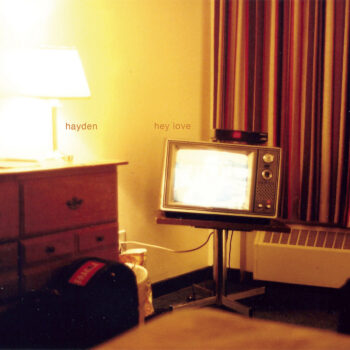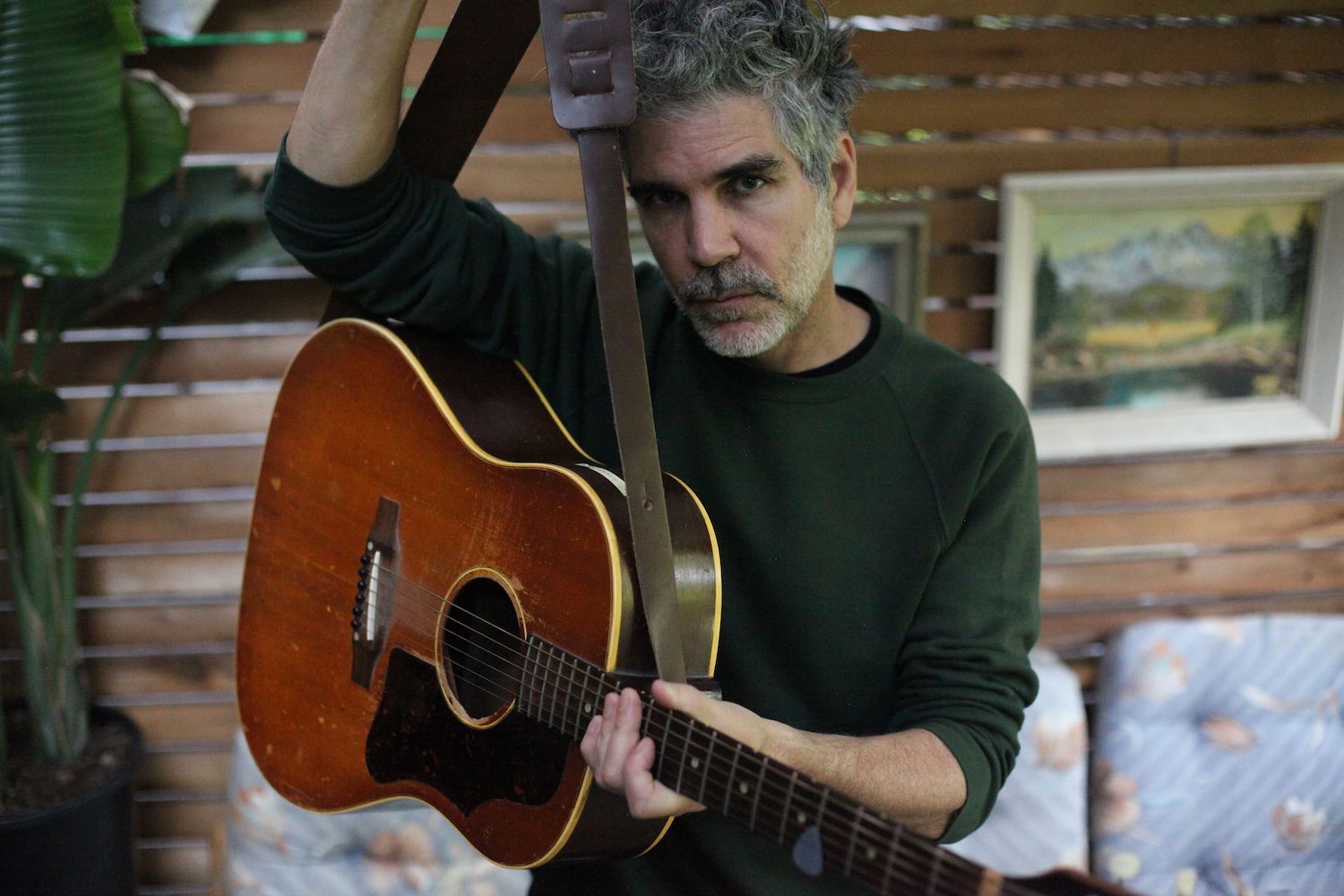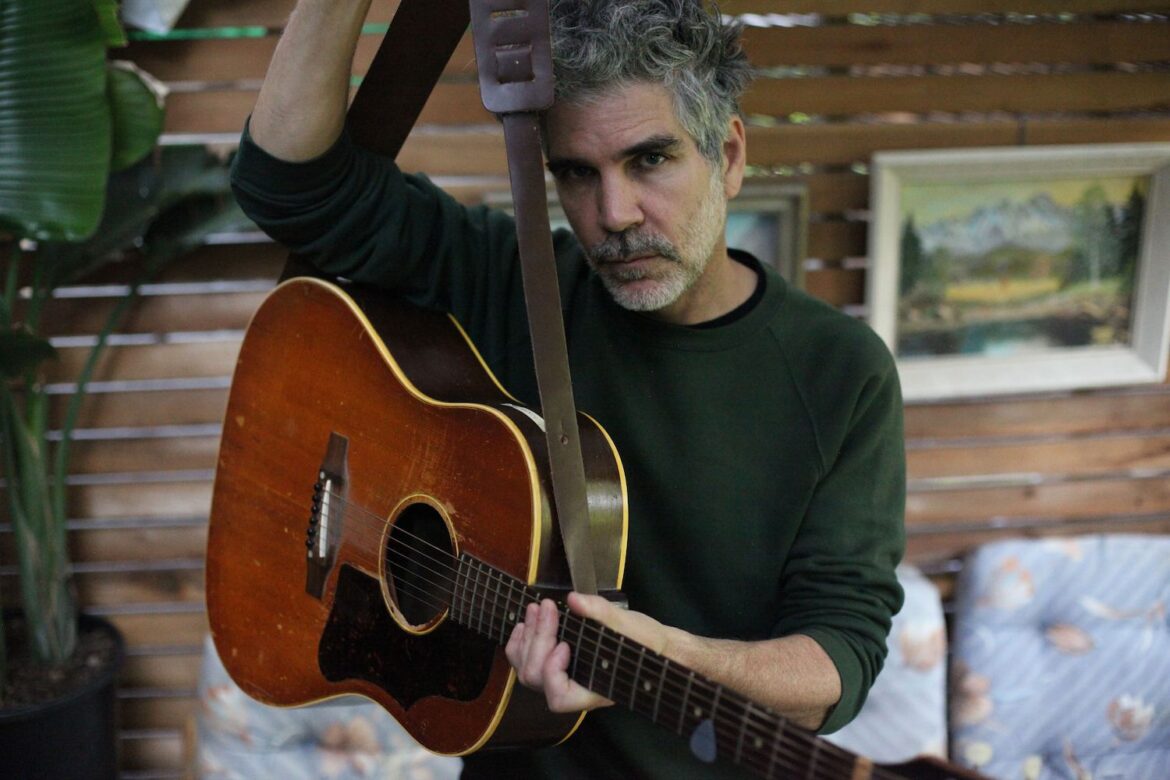Hayden Desser’s ‘Are We Good,’ featuring contributions from Leslie Feist and Matt Berninger, is often warm and welcoming in sound but, in being the product of tumultuous times, seeks out answers where they are not easily found.
Stream: ‘Are We Good’ – Hayden Desser
For a number of years, I used to have a job where I was not always at a computer.
More often than not, specifically within the first, like, two or three years of the job, I was rarely at a desk, or a computer, for more than a few minutes—regularly walking, standing, lifting, or bending, as opposed to anything else.
For five years and change, I worked within the produce department at a co-op — not a glamorous job by any means, since I often came home with what I affectionally called “produce goop” on my flannel shirt, or my Dickies brand work pants. It was a job where, for a while, I rarely stopped moving, or found that I ever needed to sit down to work at one of the desks, on a computer, in a back office, because within the first, like, two or three years, it just didn’t come up all that often.
The unpredictability of elements within the job — like when a large delivery might arrive, or some small figurative fire somewhere would need to be figuratively extinguished, made it a challenge to ensure I was at a desk, with a computer, if I needed to be for something unrelated to the job—10:00 a.m. on Thursdays, for example, to try and snag something from that week’s Supreme drop, or manically refreshing Ticketmaster to secure seats to a concert the moment they went on sale.
I remember a morning, sometime in the spring of 2018, when I needed to be at a computer at a specific time in an attempt to secure a copy of the extremely rare vinyl pressing of The Closer I Get — the sophomore album from Hayden Desser. The album had originally been released in 1998, then was reissued as a double LP in 2014 for Record Store Day, and Desser was personally selling a very, very small quantity of the album from his online store, and I was hellbent on obtaining one.
My boss, at the time, always found it very novel when she’d catch me hunkered down at a computer close to the top of the hour on a Thursday or Friday, my wallet out in one hand to enter payment information, my other hand gripping the mouse tightly, clicking refresh on Google Chrome as, say, 9:59 a.m. became 10.
It’s funny, now, retrospectively, to think about however many other fans of Desser’s were in the same position I was in—like, dozens? hundreds?—readying themselves to be one of the lucky few that made it through the checkout with a copy of The Closer I Get. And I almost got there—with the record in my cart, I was trying to make my way through the checkout process, the web store slowing to an anxious crawl with several others, elsewhere in the world, all doing the very same thing.
But by the time I got to the payment screen, mashing down on the “submit” button, it was too late—the record had been snatched from my cart, and someone else with faster internet, or maybe just slightly more good fortune, had made their way through to the finish line with it in their hands.
My boss was surprised at just how quickly this moment came and went, with me walking away from the desk and out of the office, empty-handed—and her, more or less bewildered by what she had witnessed.

In the early years, once I began regularly writing about music, my pieces, or reviews, or whatever you want to call them, were much, much shorter than they are now — and, truthfully, I can admit that during the first few years, when the writing was much shorter than it is now, part of it had to do with the fact that I was still developing a voice, and a style, but another part of it had to do with the fact that I was simply spending a lot less time listening to, or immersing myself within the albums I was writing about.
I am remiss to say that I would put together a “knee-jerk reaction” to the albums in question, but in hindsight, I can say that there were a number of cases where it, perhaps, would have behooved me to listen more than once or twice through, or to have jotted down some notes, or even assembled a rough outline of what I wanted to say, and how I wanted to say it, before sitting down with the computer balanced on my lap, and placing my fingers on the keyboard.
In the early years, once I began regularly writing about music, my pieces were much, much shorter than they are now, and they often were much more casual in their tone, or the language that I found myself using — breaking the fourth wall between myself and the reader in a different, and perhaps less thoughtful or engaging way, than I try to do now.
I think, in several cases, I was trying to be funny, or thought that I was funny, but after a decade, it is quite difficult to even quickly glance back because the humor, or tone that I was going for, has not aged very well at all, and in several cases, I question if it was even effective, or funny then, because it certainly is not now.

The last time Hayden Desser released a new, full-length studio album was in the spring of 2015 — Hey Love, which I wrote all of 850-ish words about, and even within the review itself, in its much more casual, or conversational, or even approachable nature, I confess that I listened to the album more or less only the one time, while I was on a walk home from work, and then proceeded to collect whatever thoughts I managed to pull together during that one time through—not even really listening with real intention.
And I was not exactly unkind to Hey Love, though I was a bit glib in my assessment—it lacked the urgency and palpable longing that The Closer I Get had, and therefore, I was ultimately nonplussed by a bulk of it, stating that it simply, as an album, existed, which is really neither bad, nor good, I guess, but it is not exactly a resounding endorsement, and it does not show the artist in question, or their work, a lot of gratitude.
I was not exactly unkind, but I could have, perhaps, put forth the additional effort required to be a little more thoughtful, or articulate, in how I felt.
Beginning with his debut, Everything I Long For, originally issued in his native country of Canada in 1995, then reissued to a larger audience in 1996 through a Universal Music subsidiary, Desser, for a while, was releasing a new album every two to three years up until 2004’s Elk Lake Serenade — the pace he was writing and recording, then, became somewhat unpredictable, with back to back albums in 2008 and 2009, then connecting with the prestigious Canadian label Arts and Crafts for his 2013 album, Us Alone, then two years later, for Hey Love.
In the years that followed, Desser, as artists often do, dabbled in nostalgia — putting together a 20th Anniversary edition of Everything I Long For in 2016, with some additional demo recordings included on the double-LP’s fourth side, then doing the same two years later with the expanded reissue of the Moving Careful EP, which was initially released in 1996.
But since winding down the campaign behind the reissue of Moving Careful, Desser has been reclusive — not so much that he had to dispel another internet rumor of his passing, as he did in 2010, but reclusive, or at the very least, inactive enough for me to wonder, at times, what, if anything, he might be up to w/r/t writing and recording something new, or if he, like so many artists do, had decided to move along to something else and put this part of his life behind him.
With music, and writing about music, and returning to an artist I have followed for a while, both as a listener, and later in an analytical way, I find that I continue to, and despite my best efforts, cannot help but ruminate on the concept of time and of distance — the space that forms between two points, and then what, if anything ends up forming within that space.
I think about where I was at the first point, where I am now, at the second point, and the things that occurred within the space between — certainly, now, the world as a whole has changed in ways that are difficult to truly comprehend, but on a much smaller and much more personal or insular scale, I think about how I have changed — who I was, say, in 2015, to who I am now, eight years later.
I would like to believe that I have changed for the better — that is what my therapist would call growth — but I think about the 32-year-old, listening to Hey Love on a pair of headphones from the smartphone crammed into my front pocket on a walk home from where I worked at the time, and how unmoved, for better or for worse, I apparently was by it.
I think about that 32-year-old as the first point, and me, now, on the cusp of my 40th year, as the second point — and I think about everything that fills the space in between; I think about Hayden Desser, as well, and who he was in 2015 when he released Hey Love, as one point, and who he is now, or how he is now, as the second point, and everything that fills the space in between of those eight years as he readies and reveals Are We Good, an album with an extraordinarily loaded and layered question as its title — a personal and often poignant collection of robustly orchestrated songs that, in response to the question within the title, and then later, a titular track, ask, wants to provides some kind of assurance, but it is a question that is left lingering because there, perhaps, is no easy or certain way to answer it.
 And there are, perhaps, versions of ourselves out there, somewhere, that are different in some way — perhaps great, or quite noticeable, or perhaps rather small, or ultimately insignificant, if the last three years — or, at the very least, a majority of 2020 and 2021, had simply not happened.
And there are, perhaps, versions of ourselves out there, somewhere, that are different in some way — perhaps great, or quite noticeable, or perhaps rather small, or ultimately insignificant, if the last three years — or, at the very least, a majority of 2020 and 2021, had simply not happened.
There are versions of us that never came to be, or experiences that never occurred, because the trajectory of the world was so severely altered, and we were thrust, unbeknownst to us, into who we are now.
I think about that — not a lot. I try not to think about it a lot, anyway, because it just makes the last three years all the more difficult. But I think about it.
There might be one or two exceptions, but I was never all that interested, or felt very compelled, by “pandemic albums” — things that were put together in the spring or summer of 2020 — maybe a little rushed or pushed out into the world prematurely, and perhaps made out of frustration or maybe even boredom; however, what I have found that I am much more interested in, and am compelled by, are things that were not made as a “response,” per se, to living through 2020 and even 2021, but rather a reflection of the time — like, the time available, as a concept, certainly, but also a personal reflection on that time — how it was lived, and what that means now.
Heading into 2020, it had been five years since Desser released Hey Love, and two since the reissue of Moving Carefully, and if not for the pandemic upending everything, there is, perhaps, a version of Hayden Desser that would have recorded a different album entirely than the one Are We Good would wind up being.
Or, as the press release for the album seems to indicate, there is perhaps a version of Desser that would not record an album during that time at all.
Apparently six years in the making, with a bulk of the work taking place at his home studio, which he calls Skyscraper National Park (also the name of his third full-length album, released in 2001), Desser was initially working through a bout of writer’s block that made the creation of new material rather difficult at first, coupled with his efforts to his life at home — Desser and his wife, production designer and filmmaker Christie Greyerbiehl, are parents to a child with developmental disabilities.
Are We Good is not a “pandemic album” by any means, and I am remiss to say that it was “inspired” by the way our lives have all changed over the last three years—though that time did inevitably and unavoidably play a role in shaping it. It is not a response to anything, really, other than the current human condition, and it is an 11-song collection — at times stark, at times full of optimism and warmth, and it is almost always beautiful and scope and sound.
It is a thoughtful reflection on time — where we are right now, certainly, but also specific, vivid moments from the past — the lives before this one — that brought us here.
Something that surprised me, and still surprises me now, when I think about it, in listening to the reissue of Everything I Long For, was just how dissonant and angsty Desser was, at times, early in his career. Sure, some of the instrumentation on The Closer I Get could be a little ramshackle, and a little noisy, but there is an unhinged, unsettling quality to the depths he plunges the sprawling “Skates,” sequenced as the centerpiece to Everything.
The further along in his career he’s gotten, Desser, both as a singer, and within his arranging, has aged with undeniable grace — a quality that you can hear from the moment Are We Good opens, and is carried through until the end.
Between the long-gestating creation of the album, and a partial product of these tumultuous times, and with a title as weighty as Are We Good, with all that could, or could not, mean of someone, it should not be surprising that there is a severity, and a substantial emotional gravity to a bulk of the album’s 11 songs — at times, beautiful and stunning in how effectively they can depict moments, or fragments, so vividly but also so palpable in just how fucking somber they are.
But throughout, Desser smartly finds the balance between the most pensive moments, the most whimsical or at least lighter in tone (there are a few of those), and then the songs that are somewhere in between the two extremes, both sonically speaking, as well as lyrically.
There is a robustness, overall, as well as an immediacy to Are We Good sounds and feels — the album’s production is absolutely meticulous in the attention to details you can hear within the world of every song — right down to the level of intimacy created by the rickety creaking of the piano bench, or just how sharp and crisp the snare drum hits are on every drum track.
Are We Good does open from well within the starker or moodier qualities this collection has — “We Danced,” the second track, eventually grows to become a kind of menacing waltz, but begins as a brooding simmer, with big, strummy acoustic guitar chords cutting through a bass drum stomp keeping the rhythm, and warm, wavy, tremolo-ed electric guitar flickers osculating around it all, while Desser, at times breathlessly, relays disorienting dreamlike imagery in his lyricism.
Desser, though, quickly understands when it is time to step out of the shadows, and the further along you get into the first half of Are We Good, he begins to lift the mood, like on the jaunty, shuffling “Terry Cloth Blue (Every Single Thing),” finds introspectively, but playfully, retracing moments of his life set to rollicking piano melody, and is eventually joined by a small wind and brass ensemble that adds to the kind of subdued jubilance of the song.
This kind of juxtaposition between the extreme ends of the emotional and sonic territory the album exists in is something Desser continues to play around with throughout Are We Good — working, as needed, to keep things musically very light, and lyrically, assuring and hopeful, on the bubbling, slinking “Nothing Wrong,” and uses it to relieve the tension created by some of the heavier moments, like on “Miss Fort Eerie,” which was the second single released in advance of the album’s eventual announcement—there, Desser breaks the fourth wall within his lyric writing as he writes from a place of self-awareness in addressing an off-stage “you” in how he recalls an anecdote from touring in the early days of his career, set to a restrained, kind of woozy and swaying rhythm that, similar to a number of other places on the record, is subtle in just how infectious it can be in terms of melody.
Where this contrast is, perhaps, most apparent, and is most successfully executed, is within Are We Good’s first three songs—specifically, the first and third tracks: “East Coast,” the smoldering, swirling, and murky piece that opens up the record, and then the bright, unavoidably catchy, and downright fun “On A Beach,” which was released as the third single, overall, from the record, and shared in conjunction with the announcement of the album itself.
“On A Beach” is not exactly the key to understanding the album, but it is a song that came together with enough ease for Desser that it was the key to pushing through the writer’s block he was struggling with, then finding his way through the rest of the album’s creation.
As Desser explains in the press materials for Are We Good, the song was originally conceived through a week-long, “song a day” workshop that was being coordinated by Leslie Feist. “On A Beach” was his submission to the other songwriters involved on their fourth day together, and he continued tending to it following the workshop’s conclusion—eventually reaching out to Feist and asking if she’d be willing to contribute additional vocals to the track, which, as Desser points out, and as is clear in both the song itself, as well as way it was adapted into a music video, her guest appearance, and how it is structured, turns it into more of a conversation between two people—something that, even in the carefree kind of feeling it has musically, gives it just enough emotional depth in the lyricism.
The video, featuring a cameo from The National’s Matt Berninger (Desser has a loose connection to the band dating back to around the time their 2007 effort Boxer was released), also stars Steve Buscemi, with whom Desser collaborated in 1996 for the theme to Trees Lounge, a bleak, independently released dark comedy that Buscemi wrote, directed, and starred in. Buscemi, for the clip to “On A Beach,” plays the role of a hypnotherapist and seemingly a couple’s counselor, lulling both Feist and Desser into a literal interpretation of the song’s lyrics which, at their core, about are trying to, if even temporarily, reconnect to a time when things were much simpler.
“All the things that trouble you fall right out of the room, and we begin,” Desser sings in the song’s opening verse; then, later, when Feist takes the second, adding, “Find yourself in a world where you can simply relax—see most of your worries lapse, or seem absurd.”
It’s saccharine, yes, and certainly Are We Good is not a “hopeless” album by any means, but it is the moment among this collection of songs that is the most optimistic in how it arrives. The song’s arranging, also, helps to craft that kind of feeling of hope, or optimism, in its thick, rollicking bass line, playful shuffling rhythm, and layers of blippy synthesizers that arrive near the halfway point, and handclaps underneath it all, creating something that is, regardless of if you are in the mood for it or not, undeniably infectious (it has been stuck in my head for days, now, despite my best efforts), and a gentle, winking reminder that even when things are seemingly at their worst, there are brief, shimmering moments of reprieve like this out there.
And if there are moments like this—flickers of jubilance, or a lightness, the real contrast to this, or at least what Desser has on the opposite end, appears much later on in Are We Good’s sequencing, with “Lay This In My Mind,” but it is also how it opts to open the record, on the breathtaking and haunting “East Coast.”
In the era of how albums are often rolled out now quite slowly, and deliberately — with singles being issued well in advance of any formal announcement, in an effort to build momentum, or interest, or whatever, when “East Coast” arrived in October, out of the context of the record as a whole and delivered with a kind of “here is a preview of what I’ve been working on” mentality to it, I did have both hopes and suspicions that Desser, both in returning with a new single and prepping for tour dates across different portions of Canada, would have more music to share sooner rather than later.
There is a measured, dizzying feeling to “East Coast,” specifically in how Desser lets the piano arrangement swirl unrelentingly throughout the entirety of the song — an element to it that is all too easy to get swept away by, especially the further along into the song he guides you, and as other, quiet instrumentation is introduced, like the thumping bass notes and barely there snare drum brushing that folds themselves into the tumbling rhythm, perpetuated by the swaying sensation of the piano, and the woozy, kind of mumbled way Desser sings the song’s stark, poetic lyrics.
If a moment like “On a Beach” is a glimpse of hope, or they want to believe in the potential for things to shift toward a less stressful or chaotic place in life, “East Coast” is a rumination on the desperate need for assurance, and it is that kind of writing—surprising in its frankness, but also cloaked in just enough ambiguity, that makes it as impactful and captivating as it is.
“I need you now like I needed you then,” Desser begins, his voice low, rumbling up against the piano keys, plunking out frenetically underneath him. “Like I’ll need you till the end,” he continues. “But I can’t recall this feeling at all.”
Throughout “East Coast,” Desser continues to play with this contrast in something that is, allegedly, unending in its granting to another person, with the implication that an unforeseen end is, in fact, on the horizon. “I want you now like I wanted you then—like I’ll want you till the end,” he contests in the second verse, before admitting, “But it sure appears the surface is near.”
“I love you now like I loved you then — like I’ll love you till the end. But I can’t refuse this kind of blue.”
The desperation, or need for some kind of assurance in the face of difficulty, is what he saves for what serves as the song’s choruses—“Just like that we were steered—no we’re what I most fear….I must fight for you, my dear,” he croons solemnly early on in the song. Then, near the conclusion of its lyrics—it does end with an extended instrumental break of chintzy-sounding synthesizers and distorted guitar notes—“Through partial ocean-sprayed views, a darkness ensues. And as we become something new, you must fight for me too.”
Desser, then, in a sense, returns to this kind of coastal imagery, and this somber arranging, in the penultimate track, “Lay This In My Mind,” which is exponentially less swirling, and woozy in how it sounds—with that dizzying feeling replaced with a terrible pang of melancholy, and the desperate need for any kind of assurance that the figurative storm can be weathered has slowly turned into a sad exasperation and not an uncertainty of what to do next, but an uncertainty in how to get there.
“Waves — how you love their ways,” Desser sings, a dejected tone in his voice. “How many times, when we were side by side, in the night we’d never hide, did you lay this in my mind”; he then returns to a similar format for the additional verses, like in the second, where instead of looking out on to the waves, he is looking up. “The skies….how you love their goodbyes. How many nights when we were side by side, in the pink and yellow light, did you lay this in my mind.”
It’s effective and sparse in how it crafts a narrative with just enough information, and evocative in the beauty it depicts, but the unnerving reason these images are being depicted.
“We both know this place ain’t hard to find,” he resigns as the song’s chorus.
A sad exasperation, and not an uncertainty of what to do next, but an uncertainty in how to get there.
Are we good?
How many times is this a question you have asked someone in earnest within your lifetime—specifically within the last three or four years, when there have, perhaps, all found ourselves within circumstances that have pushed us to an emotional breaking point, placing unnecessary duress on a relationship.
How many times is this a question you have asked of someone you care about, in a moment of uncomfortable tension, or when you begin to worry that the connection you once had felt like it was beginning to slip away.
Are we good?
There’s a casual nature to it — not exactly cavalier, but it can be delivered in such a way that it may appear to laugh at whatever is causing the tension, or the feeling that connection is no longer as strong as it was, because if you cannot laugh within the long shadow of something serious, what can you do?
Are we good, as the album’s title, is not necessarily the conceit to the album itself, does carry a lot of the weight found within specific moments in these songs, and “Are We Good,” as a titular track, continues the exploration of these uncomfortable tensions we often find ourselves in, in our relationships or dynamics with others.
“Are We Good” is one of three songs that Desser co-wrote with The National’s frontman and primary songwriter, Matt Berninger — the two had collaborated on the spiraling and desperate “Take Me Out of Town,” from Berninger’s 2020 solo album, Serpentine Prison.
Berninger is not the only member of The National that had a hand in the creation of the album — one of the band’s guitarists, multi-instrumentalists, and now an in-demand producer among pop music elite, Aaron Dessner was behind the boards for “We Danced” and “It’s Just Me.”
Even though Dessner was not involved in the production of the title track here, “Are We Good” does have a National-esque lean to its instrumentation and the overall tone it strikes. The song has a grand, swaying feeling to it, as well as a cavernous sounding piano, playing a somber, at times dramatic melody, with the drums creating a rhythm that acts as a pendulum, pushing the song back and forth gently, with electric guitar lines—at times it seems like there are at least three at work here, coming in like rippling, cascading waves, building up toward something much, much larger before the song slowly fades into silence.
Given the theme of “Take Me Out of Town,” which culminates in a kind of pleading repetition of the line, “I don’t know how to do this without you,” “Are We Good” is a kind of continuation of this kind of wading out into uncertain, potentially troubled and deep waters of navigating interpersonal relationships—specifically with someone you care a great deal for. There is, of course, the joke that Matt Berninger often writes songs that, buried underneath all that shadowy imagery and fragmented phrase turns, is the core idea of, “I love my wife so much I’m afraid that she will leave me”—but what I have found, especially within the last three or four years, is that asking the question “Are we good?” is not a reassurance reserved only for someone you are romantically involved with.
Regardless of how you take the thought, and lyricism, behind the album’s titular track, and apply it to a platonic or romantic situation, it wastes no time returning to that spiraling, urgent desperation, and the fear of both losing and disappointing a person you love.
“I’m walking home alone,” Desser begins. “Tripping over every stone. Everything we never do, everything I put you through.”
The punchline, or mission statement of the song, comes at the end, right before the instrumental breaks that carry us to the end, so what serves as the chorus, both times around, sees Desser making difficult admissions and trying to make amends. “I know why you needed something else. I put your love too high on a shelf. You have the greatest heart I’ve ever seen—sometimes love ain’t always all you need,” he sings the first time around, then later, change the first two lines: “Are we good enough to get through this okay?,” he asks. “I don’t wanna be alone today.”
“We never stop to count the cost,” Desser says near the end of the song. “Don’t worry about the time we lost—we never lost,” he continues before asking, and not receiving an answer.
Are we good?
Are we good?
Even when the answer is yes, or a sense of assurance to try, as it might, to calm whatever frazzled, anxious nerves you have, there is a part of you, that can be remiss to believe completely.
Are we good?
“Jesus Christ, this is so fucking sad.”
In the early years, once I began regularly writing about music, the pieces were much, much shorter than they are now—and I can admit that during the first few years, when the writing was much shorter than it is now, part of it had to do with the fact that I was still developing a voice, and a style, but another part of it had to do with the fact that I was simply spending a lot less time listening to, or immersing myself within the albums I was writing about.
I am remiss to say that I would put together a “knee-jerk reaction” to the albums in question, but in hindsight, I can say that there were a number of cases where it, perhaps, would have behooved me to listen more than once or twice through, or to have jotted down some notes, or even assembled a rough outline of what I wanted to say, and how I wanted to say it, before sitting down with the computer balanced on my lap, and placing my fingers on the keyboard.
I’m uncertain when — at least three years ago, for sure, I found myself working within a specific process where, over the course of a week, or sometimes even longer, submerging myself within the album in question and not really coming up for air — listening a few times through, then listening once as closely and intently as possible to take notes, song by song. It is only then that I feel somewhat confident about the amount of time I have spent with it, and that I can properly articulate my thoughts.
Often, the notes are about specific lyrics, or about the way the song itself has been produced — like if a guitar track sounds “fuzzy” or “crunchy” in its tone; but other times, the notes are just observations, or reactions, to the time I spend slowly wading in before swimming out further.

One of my notes for “Window Washer Blues,” which is sequenced shortly after the halfway point on Are We Good, is simply, “Jesus Christ, this is so f*cking sad.”
Hayden Desser has never made the same album twice—not really. Moving away from the brash, lo-fi aseptic of his debut, there is a warm kind of “alternative/indie/folk” adjacent sound he has oscillated back and forth through with each subsequent album over his storied career—but I don’t think he has ever tapped into something like this.
My note for the following track on the album, “Miss Fort Eerie,” is “A story song — kind of breaks the tension of the song before it, but honestly, I just want a whole album of the song before it.”
“Window Washer Blues,” the shortest song on the album, doesn’t overstay its welcome, and honestly, perhaps an album comprised of songs this heartbreaking would simply be too much—Desser uses all two minutes and change, accompanied by a creaky piano and a subtle string arrangement that comes in underneath and adds emotional punctuation to the sentiment of the song.
The depiction of family life in “Window Washer Blues” is brief in how it flashes, like a memory that is quickly fading, and you are trying your hardest to grab onto it before it disappears completely.
“One day, work lent you a drone—I took the kids out to the lawn,” Desser begins. “It lifted off and went up high, but disappeared into the sky,” he continues, before creating a stark contrast of a seemingly sweet moment with something much more serious in the chorus.
In recent memory, I was having a conversation with a friend where I was trying to describe what living with severe depression, and trying to put in the effort to maintain relationships (most often acquaintances, like former co-workers, for example, or extended family) can feel like. In the past, and maybe I had never vocalized it before, and it was just something that I was able identity within myself, but in the past, I have described it as feeling like I was “fading away.”
And within the context of this conversation, I told my friend that, yes, it still feels like I am often fading away, but how I have been feeling lately, and the most accurate way to describe it, is that it is like there is a curtain being lowered between myself and others—it doesn’t sever the connection completely, but it does create this barrier, or obstacle, that makes it difficult for the other people in question to really see or hear me, or understand, and makes it seemingly impossible, at times, for me to find my way through the curtain to who, and what, is on the other side of it.
“We’ve got the window washer blues,” Desser croons, quietly and sadly in the chorus of the song. “We’re always outside, looking through. We’ve got the window washer blues—looking in is all we do.”
And it is fascinating—this contrast that is so effortlessly created. An image of Desser playing outside with his kids, and then suddenly cutting away to this terrible, but extremely familiar sensation of feeling completely disconnected from who you are around, or what you are doing.
We’re always outside, looking through.
It is like there is a curtain being lowered between myself and others—it doesn’t sever the connection completely, but it does create this barrier, or obstacle, that makes it difficult for the other people in question to really see or hear me, or understand.
Looking in is all we do.
Jesus Christ, this is so fucking sad. But in its utter sadness, Desser has not given a name to something that is rather difficult to truly articulate to someone else, but has elevated it enough in ways beautiful and devastating that it maybe does not need to be named at all—but it just needs to be felt.
Once again, I cannot help but ruminate on the concept of time and distance — the space that forms between two points, and then what, if anything ends up forming within that space.
I think about who Hayden Desser was in 2015 when he released Hey Love, who he is now upon the release of Are We Good, and the space that forms between those two points, and then what, if anything, ends up forming within that space—the journey one takes, and the things about this life we have that are both unexpected and not.
A friend recently asked me if I ever stop and consider how far removed my life is from what I, perhaps, at one point, imagined for myself—I told her that I didn’t, but what I have realized is there are those moments when something has shifted the course you thought you would remain on, without issue, and you have to stop and wonder, how have I ended up here, and what am I going to do about it.
I think about who I was in 2015 when I was walking home on a weekend afternoon listening to Hey Love on my headphones, sitting down to write a very brief, not exactly flattering review of the album, and then calling it a day. I think about who I am now, and the space that has formed between those two points.
I think about what, if anything, ends up forming within that space. Certainly, the world as a whole has changed in ways that are difficult to truly comprehend, but on a much smaller scale, and a much more personal or insular scale, I think about how I have changed over these eight years.
And I recognize that yes, there are going to be those small flickers of joy, or of fun, in the space that forms between those two points, but where I go to, more often than not, are the moments of extreme duress or difficulty. I think about loss, and the grief that follows and never goes away, regardless of how hard I try to convince myself I am processing it. I think about the jobs I’ve had, and left. I think about the weight I may have lost and the stress I, at any point, may have been under.
I think about the shadow of mental illness, and how I have never been able to truly escape it and run toward the light. I think about all of the times, in the last eight years, when that shadow has been so, so fucking dark and cold.
I think about how much growth, however difficult, I may have experienced, especially within the last three years. And I think about how much growth there is still to do.
Are We Good, even in its title alone, is an album that, yes, asks questions, but it also, more than asks, implores and goes as far as to plead in some instances, even all the way until the end, in “Can’t Happen Now,” one of the other songs Desser co-wrote with Berninger, where they tread back into the familiar territory of unease within a relationship: “I feel like I’m losing you baby, but it can’t happen now,” Desser quietly sings very early on in the song.
There are questions asked and implored, and pleadings from a place of uncertainty, but throughout, it’s an album that provides no easy answers, and ends in a place without assurance or resolve—because, in life, honestly, there are no easy answers, and things do end from a place without assurance.
But even in those moments where these questions, or pleadings, go unanswered, there are other moments where there are those small flashes of hope, or optimism, and sometimes those are enough to keep us going.
If you were to create a diagram that tracks the overlap in this record between Desser’s lived experience and, overall, the human condition in the year 2023, the space where those two things begin to intersect are the moments on Are We Good where you can see the most unflattering or unsavory reflections of yourself—the times when you have required or pleaded with urgency for an assurance from someone, the times when you have found that a dynamic has shifted of its course and you have uttered the phrase “Are we good?,” the times when you have felt a disconnection from those around you, and the times when you have chased after that flicker of potential hope, or optimism.
Are We Good is a welcome return and a welcome return to form for Hayden Desser —breaking the nearly decade-long silence and coming back with an extraordinarily strong, thoughtful collection of tunes.
Musically, this record both finds him pushing himself forward or in new directions as an arranger, while maintaining the warm familiarity of the finest work in his canon. The questions, or uneasy pleadings may go unanswered once the album ends, yes, but even then, there is an infectious nature throughout, both subtle and not, that you can coast on for just a little bit longer to take the place of the answers that are never provided.
— —
:: stream/purchase Hayden Desser here ::
— — — —

Connect to Hayden on
Facebook, Twitter, Instagram
Discover new music on Atwood Magazine
© Christie Greyerbiehl
:: Stream Hayden Desser ::


 © Christie Greyerbiehl
© Christie Greyerbiehl





